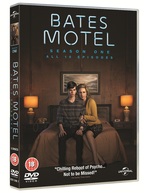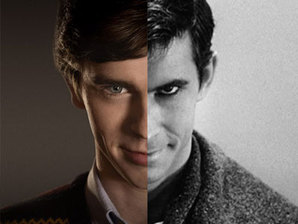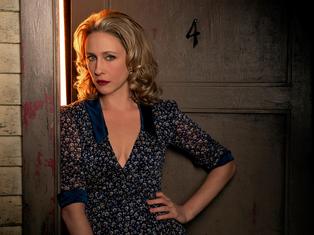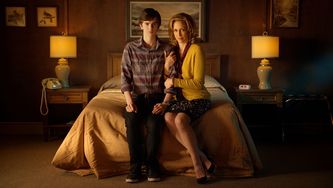
The world created by Alfred Hitchcock back in 1960 for the film Psycho is a landmark in terms of production and cultural impact. With Hitchcock taking a huge financial risk on the project, the director had to keep the production as tight as possible, whilst still working to create something with immediate shock value and a lasting impression. And it worked. Over fifty years later, it is still a watershed moment in horror cinema.

Given that such a dark heart beats beneath the chest of Psycho, it would seem rather strange to try and translate the property to a small screen in the shape of an ongoing television series. However, that didn't stop Universal Television from giving it a shot in the form of Bates Motel. It should perhaps be noted that this is not the first time such a prospect has been undertaken, since another series (also named Bates Motel) was attempted back in 1987. That project never took off and perhaps with good reason, since it tried to move forward from the films with a whole new set of characters.
This new Bates Motel, under the guidance of Carlton Cuse and Kerry Ehrin, took a different approach to the material. Their series would be a prequel, looking at the early days of the titular motel and mother-son duo behind it, Norma and Norman Bates. (This approach seemed to be hip thing of 2013, with A&E's Bates Motel landing around the same time as NBC’s Hannibal). This certainly appears to the best way to go, finally offering the chance to look at the early days between the two characters that would come to have one of the most notorious relationships in film history. Much is suggested by the Psycho films, but this will be the opportunity to really get under the skin of mother and son. By choosing to look into these characters, it instantly sets itself in a position to capitalise on all of that potential so evident in the original text. All of that complexity, the psychological avenues, the oedipean implications, it all makes for something that could be great. And, on a performance level, it's difficult to fault Bates Motel.
The cast assembled for the show is of a pretty high calibre, and everyone works well for it… but let's be honest, it's all about the ones they got to fill the shoes of Norman Bates and his dear mother. In Norman, they have Freddie Highmore, once pretty much the hardest working child actor in Hollywood, he now stands before us as the younger version of one of cinema's most infamous characters. Highmore does great work as Norman’s younger self, channelling the shiftless energy and awkwardness of Perkins’s original incarnation into his own performance, but shaping it with his own skills. Being the teenage Norman, his ability to mask his somewhat uncomfortable nature has not yet fully developed, so his closed body language and naiveté are more on the surface. Highmore is also just as adept at turning this boy’s ill-at-ease nature into the flat dead stare of someone capable of something cold and terrible. Highmore really does prove himself up the task of filling those shoes.

If only the rest of the show could stand up to such capability.
By taking on the task of exploring the relationship between Norman and Norma Bates, the show must also take on exploring the small town that surrounds them, and this is where it falls short. The thing that made Psycho shocking at the time, and indeed the crimes of the man who inspired the film, was that it came from a wholly unsuspecting place. The shock and horror of something so utterly, almost incomprehensibly awful happening in such a sedate and normal place is as much a part of the Psycho legacy as a good shower.
In an attempt to flesh out the town in which the series is based, Ehrin and Cuse have tried to create a town that already harbours a dark and terrible secret. Several actually, and they are as ridiculous as they are unsubtle. Pot fields, sex slave traffickers, police corruption, it’s a nightmare of over-the-top twists and complications that only serve to smother the central duo that the entire series seems predicated on. Is it really possible to maintain the same level of shock at the ultimate crimes of Norman Bates when, during his teenage years, the unnamed thugs of the town hung a burning corpse up in the main street to “send a message”? Even the first episode features a pretty frank rape scene that, although it does makes sense in a character context, takes its stance in the earlier mentioned world of sexual violence from Psycho and pushes it to the point of breaking. Some may even say beyond that point. As much as the original world is a grisly one, this new is just utterly grotesque.

It’s probably true to say that, ultimately, Bates Motel doesn’t really work. Some excellent performances and some decent writing aside, it is simply too brash, too lacking in the subtlety required to take full advantage of the great source material they’ve been handed. As it is, the association with Psycho is both its greatest strength and its most crippling weakness. For those familiar with the original film, the series will feel overblown and outlandish, trampling on that which they started with. Perhaps if you can separate it from Hitchcock’s classic, and its sequels, you can get some more enjoyment from the series. However, doesn’t that rather defeat the point of using these characters in the first place?
The extras on the release for both DVD and Blu-Ray are, frankly, rather anaemic. A scatter of deleted scenes spread across the discs are kind of interesting for various reasons, be they somewhat tense (Norma begrudgingly welcoming Dylan into the house) or rather funny (Norma flying off the handle at her front door). The best thing to be had is the 50-minute Q&A session in the form of a Paley Centre Panel Discussion with the members of the cast and crew behind the show, which is actually informative on some level with regard to how they went about approaching the material in the first place. It can also be as weirdly awkward and stunted as it is informative, but then that’s really just a hazard of these events in general.

 RSS Feed
RSS Feed
